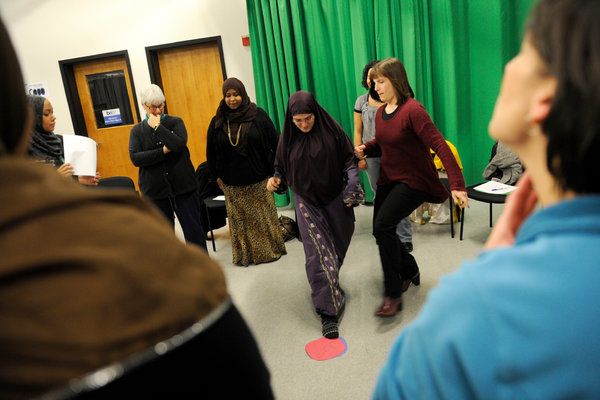Jewish and Muslim, Bonding Over Dieting

BROOKLINE, Mass. — Your mother-in-law fixes you a plate of food. Does she determine what you eat, and how much?
So went the question, part of a nutrition-themed game inspired by “Family Feud,” during a meeting of a women’s weight-loss group here the other night.
Charlotte Badler, 23, lunged forward to answer.
“What if you asked if you could wrap up the rest of it for tomorrow?” she offered, and then addressed an imaginary mother-in-law: “Because I would love to take it to lunch at work tomorrow.”
“I love it,” cheered her teammate, Adebola Yakubu-Owolewa, 29. The two leaned in for a high-five.
Ms. Badler is Jewish; Ms. Yakubu-Owolewa is Muslim. They and eight other women — five Muslims and five Jews — meet on Tuesday evenings at a Boston-area high school for lessons and activities around healthy eating and self-esteem. The group is the United States introduction of Slim Peace, a nonprofit organization that brings Israeli andPalestinian women together around the universal theme of weight-loss support.
Yael Luttwak, a documentary filmmaker, founded the first group during the second Palestinian uprising, more than a decade ago, hitting upon a formula of using women struggling with their weight as a tool for Israeli and Palestinian connection. She was in a Weight Watchers group in Tel Aviv and wondered if the leaders at the time, Ariel Sharon, Israel’s prime minister, and Yasir Arafat, the Palestinian Authority president, might be more likely to talk peace if they tried to lose weight together.
When Ms. Luttwak, who made a documentary film about the first Slim Peace group, visited American Jewish communities to talk about her work, they told her they had problems in their own communities with anti-Muslim sentiment and anti-Israel sentiment, and it occurred to her that the Slim Peace model could be brought here. After a talk and screening of her film in Boston, she was approached by Emma Samuels, who said that she would like to help start such a group here and that she had just the partner to run it with: Aminah Herzig, a close friend and fellow dietitian who is Muslim. They now lead the Boston group, facilitating conversations on healthy eating and cultural differences.
The plan is to expand Slim Peace to four other American cities — Chicago, Cleveland, Detroit and Washington — all of which have significant Muslim and Jewish populations. Groups are open to members of other faiths, and in Detroit, for example, the organization will be reaching out to the city’s large Arab-American Christian community.
“We are not a peace-dialogue group and not a conflict-resolution group,” said Ms. Luttwak, 40, who now lives in Washington. “But we are bringing dialogue and exposure.”
Mrs. Herzig and Mrs. Samuels said they were surprised by how quickly the women’s questions to each other revolved around their backgrounds and communities.
“They were hungry for that,” Mrs. Samuels said. “Here we were talking about fiber, dairy and water intake, and they wanted to talk about religion.”
Mrs. Herzig, 30, and Mrs. Samuels, 37, confide in each other about work and motherhood and take turns bringing dinner on Slim Peace nights. For the recent session, Mrs. Samuels brought steamed broccoli and chickpeas in a curry sauce atop a bed of baby kale.
The women swapped strategies for coping with cravings for food they find hardest to resist.
“I find it semihelpful to go to a substitute like an 80-calorie cookie bar,” said Debra Wekstein, a 45-year-old lawyer who is Jewish.
Hafsa Salim’s eyes widened under her brown hijab as she asked: “Do you really just eat one of those?”
“Yes,” Ms. Wekstein said. “I buy the ones that are individually wrapped.”
Mrs. Salim, 28, a part-time human resources manager, has become close to a Jewish member of the group, Julie Bailit, 41, who works at a health care consulting firm. Each has invited the other to worship services, and they check in between meetings.
Recently Mrs. Bailit was having a stressful day, and it was Mrs. Salim she reached out to, dashing off an e-mail, to which Mrs. Salim sent an empathic response.
Mrs. Salim’s skirt skims the ground, and she covers her hair in public. “When people see me they think I’m superreligious, but I have my struggles,” she said. “I feel I’m put on this pedestal, and it’s hard to live up to that.”
Mrs. Bailit told the group: “I had never spent any time with any Muslim people before this group. I feel like my whole life is Jewish.” She went on: “I’m really invested in my synagogue. I send my kids to a Jewish school. I hunger for diversity.”
Ms. Wekstein told of a Christian friend who asked if she was afraid attending these sessions. She replied that she was not. The friend, Ms. Wekstein recounted, went on, “But you would be more afraid if it was meeting with their husbands.”
“Yet another stereotype of Muslim men being violent,” said Anne Myers, 23, a Harvard divinity student who converted to Islam. “I hear it so many times, but it does not hurt any less.”
They discussed the popular assumption that Muslims and Jews are incapable of getting along.
“It’s insulting,” Ms. Myers said. “It’s not correct. I wish people didn’t think that way.”
They will continue to meet for monthly dinners at one another’s homes and possibly for workout sessions once their initial program ends. A recent meeting closed with each woman choosing one word to express how they were feeling. Words like “moved,” “joy” and “grateful” filled the quiet room.
“Sameach,” announced Ms. Yakubu-Owolewa, her face lit by a wide smile. “It means ‘happy’ in Hebrew.”

















